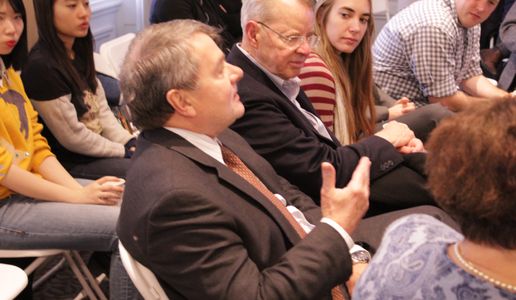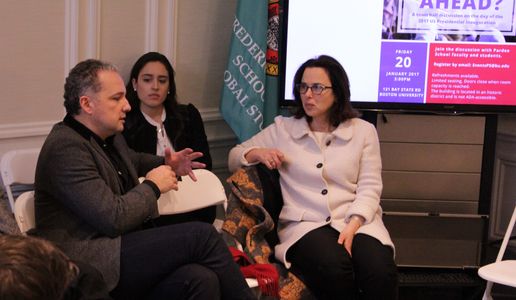BtH: Town Hall on Inauguration and What Lies Ahead
Faculty and students of the Frederick S. Pardee School of Global Studies at Boston University gathered on January 20, 2017 following the Inauguration of United States President Donald Trump for a town hall discussion as part of the Pardee School’s Beyond the Headlines, or BtH, series.
The town hall meeting took place only hours after the Inauguration, which was livestreamed at the Pardee School for students and faculty to watch. The discussion brought together expertise and scholarship on diplomacy, environmental policy, security, intelligence and the broader field of global studies for a discussion on the global implications of President Trump’s election.
On hand to answer questions and facilitate discussion were Pardee School faculty members, including Amb. Paul Hare, a British diplomat of 30 years and the British ambassador to Cuba from 2001-2004. Hare discussed how President Trump’s ambassadorial appointments could play out as well as the significance of the appointments for American diplomacy abroad.
“The bulk of ambassadorial appointments are remaining, and it will be interesting to see who he picks and whether there’s any rhyme or reason, whether there is a strong cultural identification with the countries he appoints people to and what he’s going to use the professionals in the State Department for,” Hare said.
Jessica Stern, Research Professor, said while she believes the likelihood of an attack by the Islamic State is currently more likely in Europe than on United States soil, some extremist groups based in the United States undoubtedly feel emboldened by President Trump’s inauguration and victory in last November’s election
“I’m sure ISIS would love to carry some kind of major attack, but it seems much more likely in Europe, not so much in reaction to Trump,” Stern said. “They were quite active celebrating his victory, but I don’t think they’re doing very well here. I think that this is a very exciting moment for the nationalists, extremists, white supremacists, white genocide groups and sovereign citizens in the United States. There is a whole subculture of groups that most people have never heard of that are probably pretty excited right now.”
Professor Joseph Wippl, a former Central Intelligence Agency officer who spent a 30 year career as an operations officer in the National Clandestine Service, discussed the effect President Trump would have on the intelligence community — specifically on operations in and around Syria.
“One of the first things he has to do is sign all of the covert action findings, which are issued by the President to allow intelligence agencies to conduct covert operations, and I personally believe he’s not going to sign them all,” Wippl said. “He’s not going to sign the one in Syria I believe, where I think he is going to go with Turkey and Russia to get a settlement there. The tendency has been for incoming presidents to re-sign these covert action findings.”
Min Ye, Associate Professor of International Relations, discussed statements made by President Trump’s cabinet appointees during their confirmation hearings and how some of their rhetoric seemed at odds with statements made by the President during his campaign. Ye said based on her observation of Chinese politics, these discrepancies do not necessarily indicate a rift within the administration moving forward.
“The discrepancy is designed or intended,” Ye said. “I would not take these as frictions within the government. If you only look at their rhetoric or their actions, you might think the government is very weak, powerless or not cohesive, but in actuality it’s just the way they do things.”
Cornel Ban, Assistant Professor of International Relations, looked ahead to potential consequences of President Trump’s proposed economic policies in tandem with the recent Brexit referendum in which a majority of United Kingdom voters chose to leave the European Union.
“Nobody is talking about it right now because we are in a good economic moment, 2015 was a very good year as was 2016, but we’re doing the same thing the Clinton administration did in the 1990s,” Ban said. “With Britain outside of the EU, I think we see a lot of British-American moves against centralizing international finance and picking up the bridges on international trade. It’s a very new moment.”
The town hall meeting was moderated by Dean Adil Najam. It was part of the Pardee School’s Beyond the Headlines series, an ongoing platform for events responding to the breaking stories of the day. The Pardee School also hosted a Beyond the Headlines panel in November following the presidential election on the global reaction to President Trump’s election.






